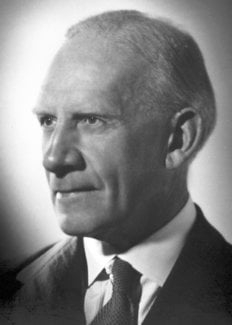Sir Robert Robinson
Biographical

Sir Robert Robinson was born at Rufford, near Chesterfield, Derbyshire on September 13th, 1886, the son of William Bradbury Robinson, a surgical dressing manufacturer who invented his own machines for the production of lint, bandages, etc., and the cardboard boxes for packaging them. He was educated at the Chesterfield Grammar School, Fulneck School, near Leeds, and at Manchester University where he graduated B.Sc. in 1906 and D.Sc. in 1910.
In 1912, he was appointed the first Professor of Pure and Applied Organic Chemistry in the University of Sydney. He returned to Britain in 1915 to take the Chair in Organic Chemistry at the University of Liverpool until 1920 when he accepted an appointment as Director of Research at the British Dyestuffs Corporation. One year later, he became Professor of Chemistry at St. Andrews and in 1922 he took the Chair in Organic Chemistry at Manchester University until 1928 when he accepted a similar post in the University of London. In 1930, he was appointed Waynflete Professor of Chemistry, Oxford University, where he remained until his retirement in 1955 when he was appointed Emeritus Professor and Honorary Fellow of Magdalen College. He has been a Director of the Shell Chemical Company and a chemical consultant since 1955.
Sir Robert has been a member of over thirty Government Committees and chairman of some of them. He was a United Kingdom delegate to the first Conference of UNESCO in 1947. He was knighted in 1939 and appointed to the Order of Merit in 1949.
Robinson’s extensive researches in organic chemistry have dealt not only with the structure and synthesis of many organic bodies, but also with the electrochemical mechanism of organic reactions. His interest in the chemical constitution of plant dyestuffs (anthocyanins) soon extended to another group of vegetable bodies, the alkaloids, where the whole series of his researches are remarkable for their brilliant syntheses. He contributed greatly towards the definition of the arrangement of atoms within molecules of morphine, papaverine, narcotine, etc. These discoveries led to the successful production of certain antimalarial drugs (they are reported in numerous scientific papers, mainly in the Journal of the Chemical Society).
Sir Robert, a Fellow of the Royal Institute of Chemistry and of the Royal Society was President of The Chemical Society, 1939-1941; of the Royal Society, 1945-1950; of the British Association for the Advancement of Science, 1955; and of the Society for the Chemical Industry, 1958. He is a Commandeur de la Légion d’Honneur and holds Honorary Doctorates of over twenty British and foreign universities. He has been honoured by The Chemical Society (Longstaff, Faraday and Flintoff Medals), the Royal Society (Davy, Royal and Copley Medals) and the Swiss, American, French and German Chemical Societies; he has also been awarded the Franklin Medal of the Franklin Institute of Philadelphia, the Albert Gold Medal of the Royal Society of Arts and the Medal of Freedom (U.S. Government). Sir Robert is Corresponding Member, Honorary Fellow, Foreign Member, Associate or Correspondant of almost fifty British and foreign learned societies.
In 1962, The Chemical Society honoured Sir Robert by establishing a Robert Robinson Lectureship, to be delivered biennially in lieu of the usual Presidential Address.
In 1912 Sir Robert married Gertrude Maud Walsh, a fellow student at Manchester University. They collaborated in several fields of chemical research, notably in a survey of anthocyanins. She died in 1954; they had one son and one daughter. In 1957, he married Stearn Sylvia Hillstrom (née Hershey) of New York.
In his younger days, Sir Robert was a keen mountaineer, having climbed in the Alps, Pyrenees, Norway and New Zealand, and he is an ardent chess player being President of the British Chess Federation, 1950-1953. His hobbies also include photography and music.
This autobiography/biography was written at the time of the award and first published in the book series Les Prix Nobel. It was later edited and republished in Nobel Lectures. To cite this document, always state the source as shown above.
Sir Robert Robinson died on February 8, 1975.
Nobel Prizes and laureates
See them all presented here.
